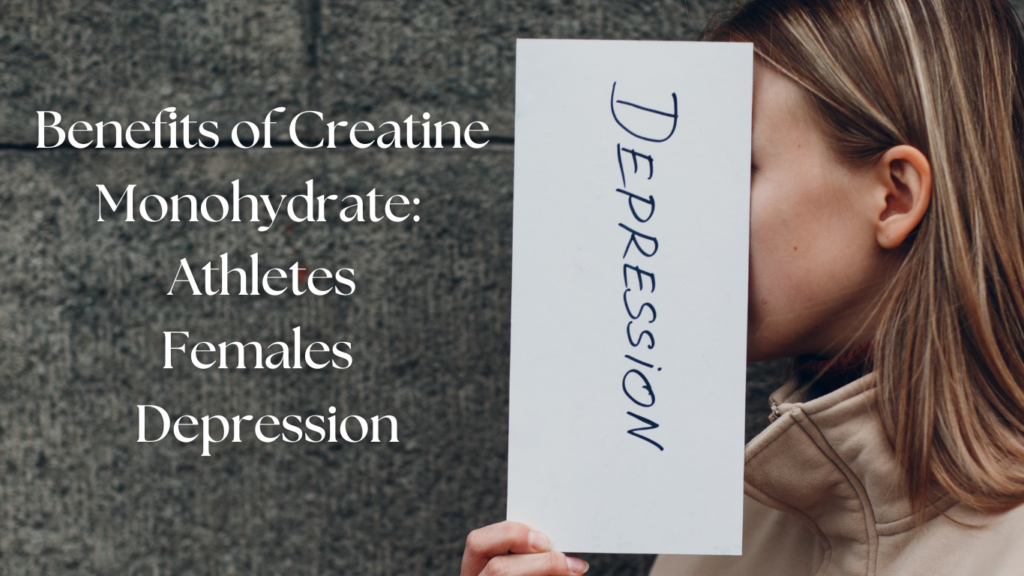
Creatine monohydrate is a popular supplement known for its performance-enhancing properties. While its benefits for male athletes are well-documented, the advantages it offers to women athletes are equally significant but less frequently highlighted. Additionally, recent studies suggest creatine may also play a role in mental health, particularly in alleviating symptoms of depression. This article aims to explore the multifaceted benefits of creatine monohydrate for women athletes, with a focus on its potential mental health benefits.
What is Creatine Monohydrate?
Creatine monohydrate is a naturally occurring compound found in small amounts in certain foods like red meat and fish, and is also synthesized in the human body. Chemically, it is comprised of three amino acids: arginine, glycine, and methionine. In the body, creatine is converted to phosphocreatine and stored in muscles, where it serves as a quick energy reserve for high-intensity, short-duration activities.
General Benefits of Creatine Monohydrate for Athletes
Creatine monohydrate has been extensively researched and is known for its ability to enhance athletic performance. Key benefits include:
Enhanced muscle strength and power:
Creatine supplementation increases phosphocreatine stores in muscles, allowing for greater energy production during intense activities.
Improved exercise performance and endurance:
By providing a rapid energy source, creatine helps athletes perform better in high-intensity, short-duration activities such as sprinting and weightlifting.
Increased muscle mass:
Creatine promotes water retention in muscle cells, which can lead to increased muscle size and potentially greater gains in muscle mass over time.
Faster recovery from intense exercise:
Creatine may help reduce muscle damage and inflammation, speeding up recovery times between workouts.
Specific Benefits for Women Athletes
Women athletes can also derive significant benefits from creatine monohydrate supplementation, tailored to their unique physiological needs:
A. Gender-specific considerations
- Physiological differences: Women generally have lower natural creatine levels than men, which may make supplementation particularly beneficial.
- Hormonal influences: Hormonal fluctuations during the menstrual cycle can affect energy levels and performance, and creatine may help stabilize these effects.
B. Enhanced strength and power:
Studies have shown that women who supplement with creatine experience similar increases in strength and power as men, leading to improved performance in sports and training.
C. Improved lean muscle mass:
Creatine can help women increase lean muscle mass, contributing to a toned and strong physique.
D. Enhanced recovery and reduced muscle soreness:
Women often experience significant muscle soreness after intense workouts. Creatine can help reduce this soreness, allowing for more consistent and effective training.
E. Potential benefits for bone health:
Preliminary research suggests that creatine may support bone health, which is particularly important for women at risk of osteoporosis.
Creatine Monohydrate and Mental Health
Beyond physical performance, creatine monohydrate has been shown to impact brain function positively:
Overview of creatine’s effects on brain function:
Creatine is not only stored in muscles but also in the brain, where it supports cellular energy metabolism and cognitive function.
Evidence linking creatine to cognitive benefits:
Some studies suggest that creatine supplementation can enhance memory and cognitive processing, particularly in stressful situations.
Role of creatine in mood regulation and mental health:
Creatine’s impact on brain energy metabolism may also influence mood regulation, offering potential benefits for mental health conditions like depression.
Creatine Monohydrate and Depression
Depression is a common but often overlooked issue among athletes. Creatine monohydrate may offer a novel approach to managing this condition:
Understanding depression in athletes:
Athletes face unique stressors and pressures that can contribute to depression, including intense training schedules, performance expectations, and injury recovery.
Mechanisms by which creatine may alleviate depression:
- Energy metabolism in the brain: Creatine enhances the brain’s energy supply, which is crucial for maintaining normal brain function and mood.
- Neurotransmitter function: Creatine may influence the levels of neurotransmitters like serotonin, which play a key role in mood regulation.
Studies and research findings:
Clinical trials have shown that creatine supplementation can reduce depressive symptoms. For example, a study on women with major depressive disorder found that those who took creatine experienced significant improvements in their mood compared to a placebo group.
Practical Considerations for Using Creatine Monohydrate
For women athletes considering creatine supplementation, here are some practical tips:
Dosage recommendations:
A common dosage regimen involves a loading phase of 20 grams per day for 5-7 days, followed by a maintenance phase of 3-5 grams per day.
Timing and duration of supplementation:
Creatine can be taken at any time of day, but taking it post-workout with a carbohydrate source may enhance its uptake.
Safety and potential side effects:
Creatine is generally considered safe when taken within recommended dosages. Potential side effects are minor and may include gastrointestinal discomfort and water retention.
Combining creatine with other supplements:
Creatine can be safely combined with other supplements, such as protein powder and branched-chain amino acids (BCAAs), to further enhance athletic performance and recovery.
Conclusion
Creatine monohydrate offers a range of benefits for women athletes, from enhancing physical performance to supporting mental health. Its potential to alleviate symptoms of depression adds a valuable dimension to its use, making it a worthwhile consideration for women looking to optimize both their physical and mental well-being.
Product Suggestion:
Creatine Monohydrate Powder Micronized PreWorkout Recovery Supplement
References
- Rae, C., Digney, A. L., McEwan, S. R., & Bates, T. C. (2003). Oral creatine monohydrate supplementation improves brain performance: a double–blind, placebo–controlled, cross–over trial. Psychopharmacology, 167(4), 619-627.
- Roitman, S., Green, T., Osher, Y., Karni, N., & Segal, M. (2007). Creatine monohydrate in resistant depression: a preliminary study. Bipolar Disorders, 9(7), 754-758.
- Rawson, E. S., & Volek, J. S. (2003). Effects of creatine supplementation and resistance training on muscle strength and weightlifting performance. Journal of Strength and Conditioning Research, 17(4), 822-831.
By understanding and leveraging the benefits of creatine monohydrate, women athletes can achieve improved performance, enhanced recovery, and better mental health.

